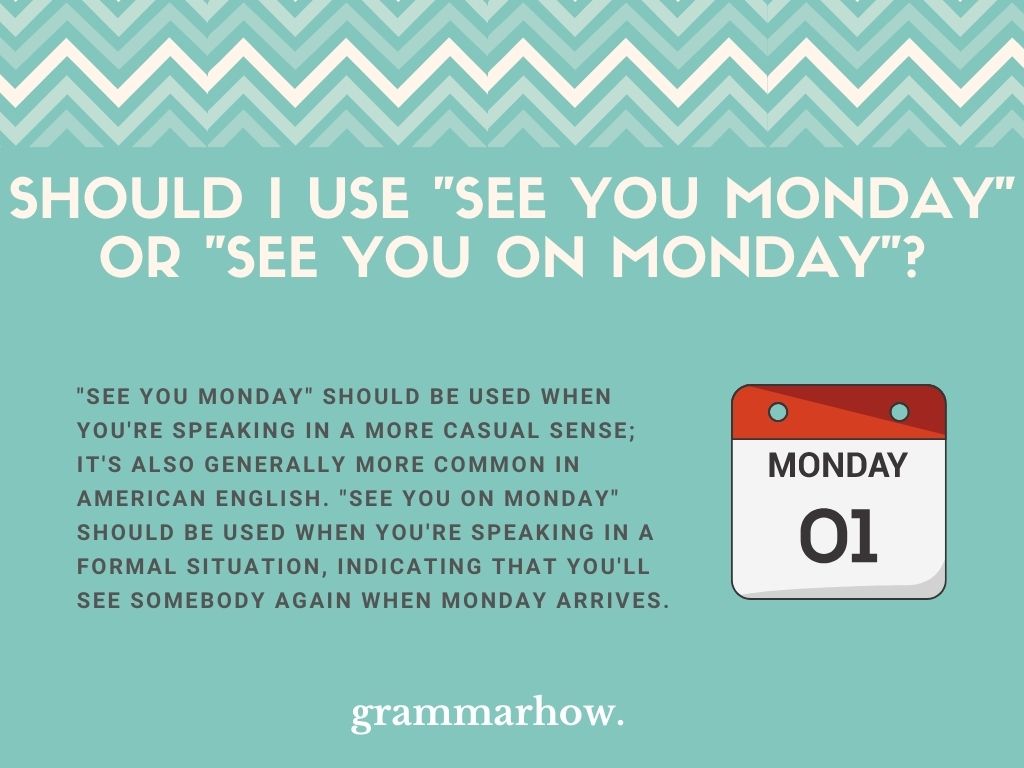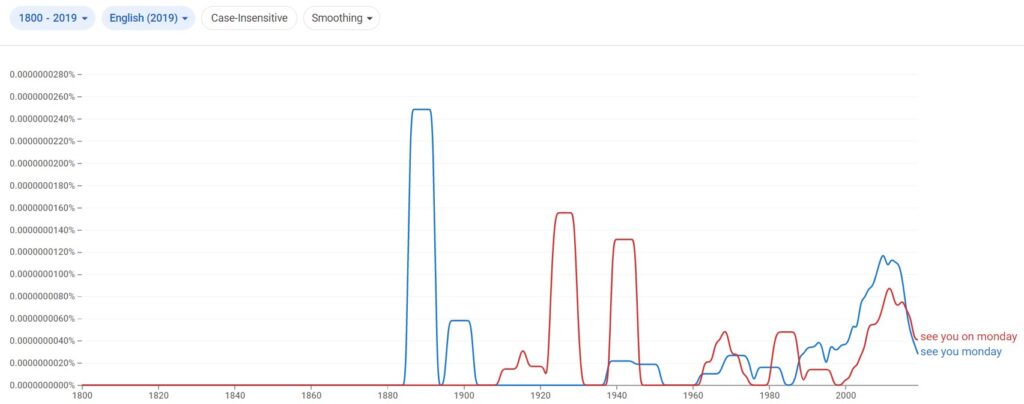The sayings “see you Monday” and “see you on Monday” look almost identical. It’s important to understand the very slight differences between the two before you try to use them yourself. In this article, we’ll talk about those differences and how to make the most of them.
Should I Use “See You Monday” Or “See You On Monday”?
“See you Monday” should be used when you’re speaking in a more casual sense; it’s also generally more common in American English. “See you on Monday” should be used when you’re speaking in a formal situation, indicating that you’ll see somebody again when Monday arrives.

The two phrases mean exactly the same thing; it’s only the tone that changes between informal and formal. Both of them say that we’ll see the person we’re talking to again on Monday.
It’s usually something we say on a Friday, knowing that we won’t see somebody over the weekend (i.e., if you work Monday to Friday and have weekends off).
Is “See You Monday” Or “See You On Monday” Used The Most?
It might help you to visualize it better if we presented you with a graph that showed which one gets more use.
If you look at these results, you’ll see just how close both phrases are in popularity. Over the last twenty years, “see you Monday” has been the more popular of the two until about 2015, where “see you on Monday” overtook it.

When two phrases are shown that close together on a graph like this using all the published literature with it written in, it shows how interchangeable they can be. Most people use either one, and some people use both depending on who they’re talking to.
The only real limiting factor on which one you want to use comes down to who you’re talking to.
Is “See You Monday” And “See You On Monday” Used Differently In American English And British English?
There are a few things that differ when you look at American English and British English. Some are a lot more obvious than others, too, so you might not realize that “see you Monday” and “see you on Monday” fall under that category.
“See you Monday” is much more common in American English. The casual tone is more acceptable in business contexts in American English. In British English, both phrases are used, but “see you on Monday” is seen as more formal and suitable for business contexts.
7 Examples Of How To Use “See You Monday” In A Sentence
Let’s go over some examples of the phrases in use. We’ll start with the more casual of the two, “see you Monday.” From here, you’ll be able to start using the phrases yourself when the context presents itself, so pay close attention.
- I’m heading off for the weekend now. See you Monday!
- It was good to see you again, but I’ve got to go! I’ll see you Monday.
- See you Monday when we’ll have our meeting about your behavior.
- I will see you Monday so we can discuss this further.
- As always, it’s been a pleasure. I’ll see you on Monday after my weekend away!
- I’ll be sure to see you Monday when I’m down from my town.
- I’m looking forward to seeing you Monday.
As you can see, removing “on” from the phrase can make it slightly less formal. However, we also chose to include some more formal situations (like example three) to show you that it can happen in this way (mostly in American English).
7 Examples Of How To Use “See You On Monday” In A Sentence
We’ll show you the more formal version, “see you on Monday” next. This one isn’t as easy to use in informal contexts since most people just drop the “on” word when they’re talking more casually with friends.
- I will see you on Monday for the disciplinary hearing.
- We’ll regroup for the committee meeting. See you on Monday.
- Let’s discuss this further next week. See you on Monday.
- I’m done for the day, so I’ll see you on Monday.
- Thanks for letting me finish up here. I’ll see you on Monday.
- See you on Monday!
- I’m having a nice relaxing weekend away from work, so I’ll see you on Monday.
Generally, we’ll include “I’ll” or “I will” before writing “see you on Monday.” This leans much heavier into the formal styling of the phrase. Including “I will” is seen as more polite, which is a requirement when you’re speaking in a formal sense.
Should You Use “See You On Monday” Or “See You In Monday”?
Whenever you want to talk about a specific day of the week, you have to use the word “on.”
“See you on Monday” is correct because you’re talking about seeing someone again and that time falling “on” a Monday. You can’t use the word “in” when you’re talking about a specific day.
“In” doesn’t apply when mentioning one specific day. It’s used to talk about a more general sense of days. You can say “see you in three days,” but you can’t say “see you in Monday.”
Should You Use “I’ll See You” Or “See You”?
If you want to keep your writing or speaking formal, it’s important to know the best way to write these phrases.
“I’ll see you” is considered slightly more formal than “see you.” However, if you want to be even more formal, then “I will see you” is the best choice to go for.
Including “I will” or “I’ll” before “see you” is a great way to show politeness in your speaking. However, all three phrases are a good way to say goodbye until a later time.
Is “See You On Monday” Formal?
“See you on Monday” is considered to be a formal phrase. However, if you want to take it a step further, you can also say, “I will see you on Monday.” Either one of these phrases works in a business sense, especially if you work a Monday to Friday job.
You might also like: 4 Better Ways To Say “See You Then/There” In A Business Context

Martin holds a Master’s degree in Finance and International Business. He has six years of experience in professional communication with clients, executives, and colleagues. Furthermore, he has teaching experience from Aarhus University. Martin has been featured as an expert in communication and teaching on Forbes and Shopify. Read more about Martin here.
